Do You Hunt Responsibly?
Safety. It's rule No. 1 when deer hunting. Be responsible. Be safe. Here are 30 things you should be sure to do (or not do) while in the field.
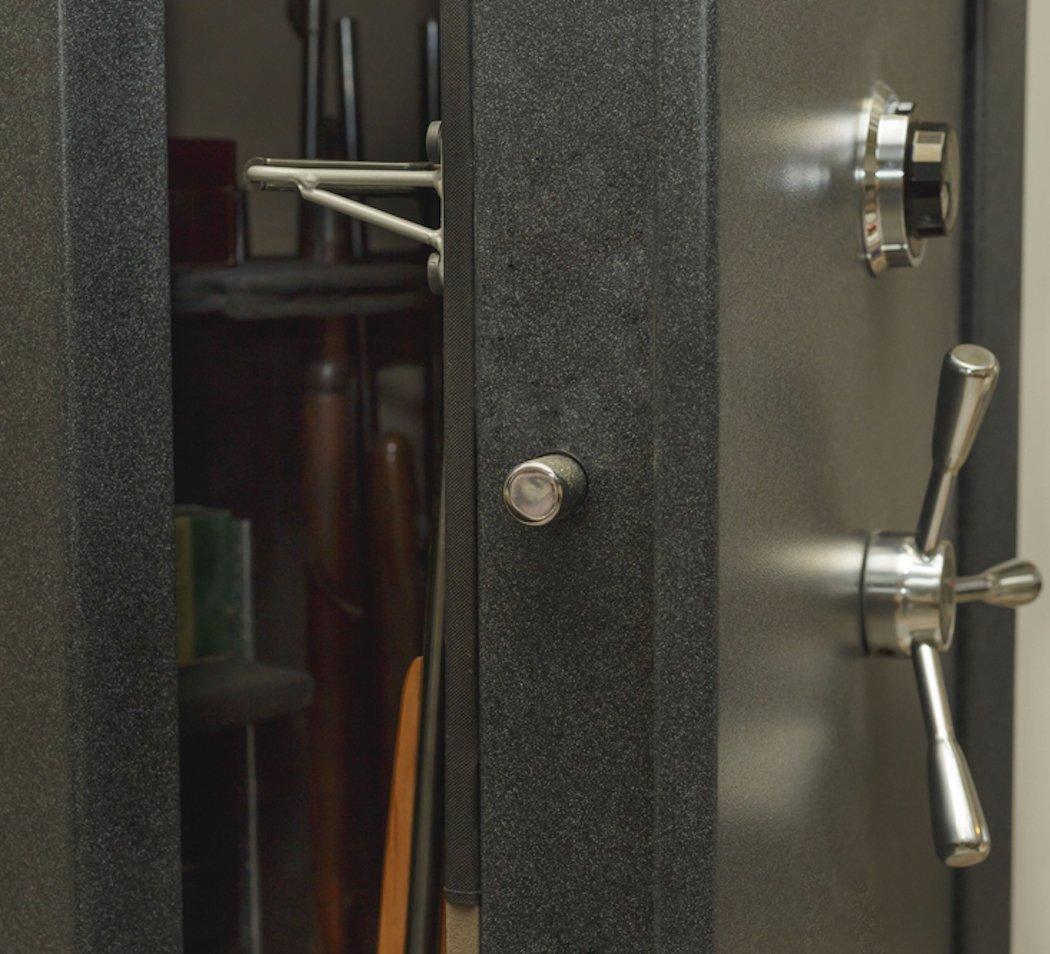 Keep Guns and Ammo Locked Away When Not Being Used
Keep Guns and Ammo Locked Away When Not Being UsedFirearm safety doesn't just extend to the outdoors. It's in the home, too. Keep your weapons locked in a safe where others can't get to them ‚ especially kids. Also, store the ammo safely and locked up separate from the firearms so that if someone gains access to the gun safe, they still don't have ammunition to use.
Photo Credit: Shutterstock / Heller
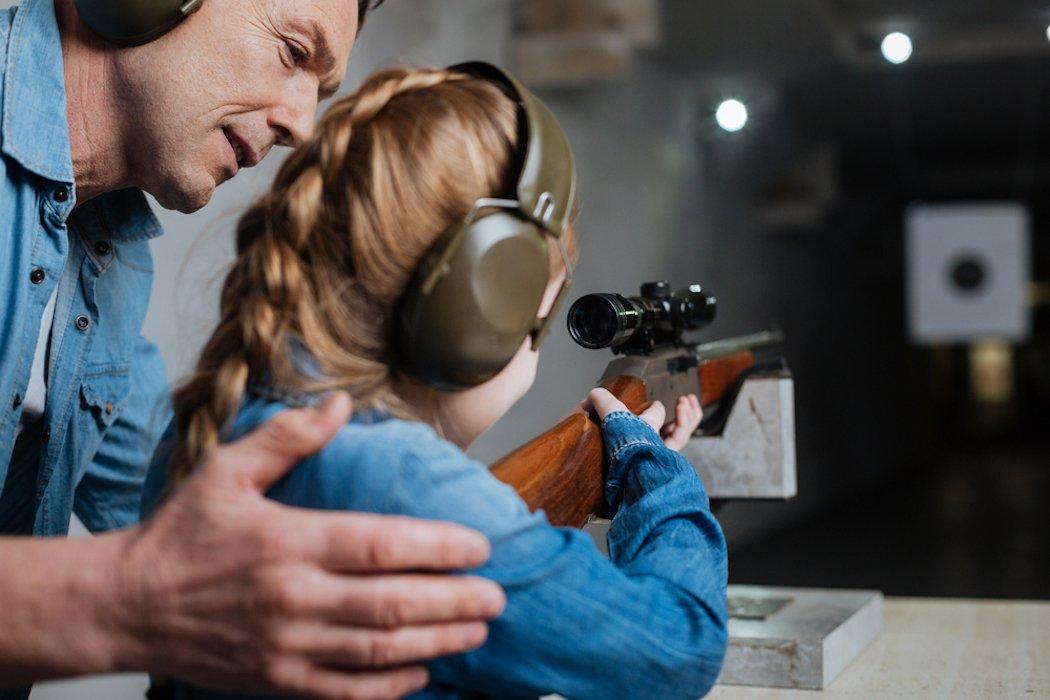 Pass a Hunter's Education Course Before Hunting
Pass a Hunter's Education Course Before HuntingEvery person who wants to hunt should pass a hunter's education course. You learn vital hunting 101 things you need to know before heading afield.
Photo Credit: Shutterstock
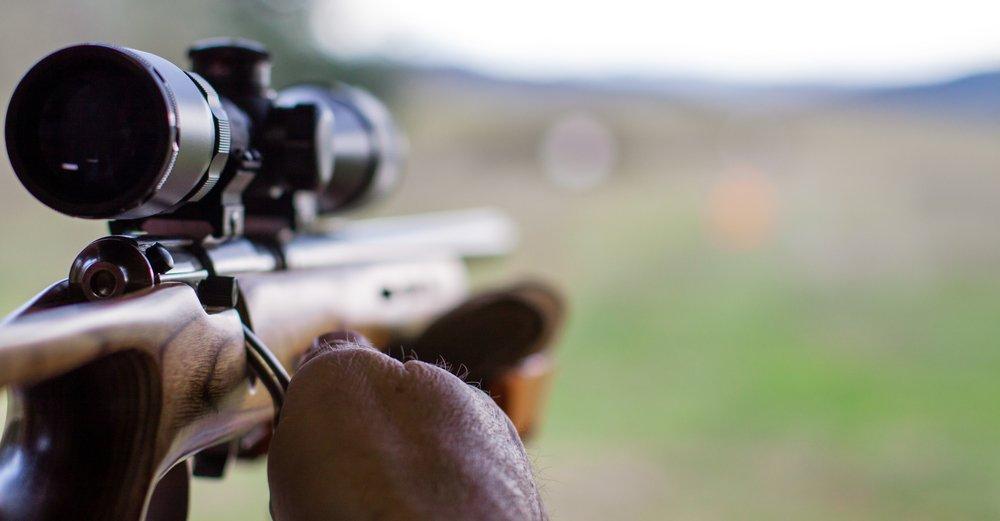 Don't Mix Drinking and Smoking with Hunting and the Shooting Sports
Don't Mix Drinking and Smoking with Hunting and the Shooting SportsDo you drink or smoke? Don't mix them with hunting or shooting. They don't belong together. Leave the alcohol and smokes out of it. Be responsible.
Photo Credit: Shutterstock / JF Wallker
 Tell Someone Where You'll Be Hunting At
Tell Someone Where You'll Be Hunting AtYou hope nothing ever goes wrong. But it can. And it does. Letting someone know where you'll be hunting in the event things go south is good insurance that someone will find you in time of need. Leave a note on the table.
Photo Credit: Shutterstock / Korovin
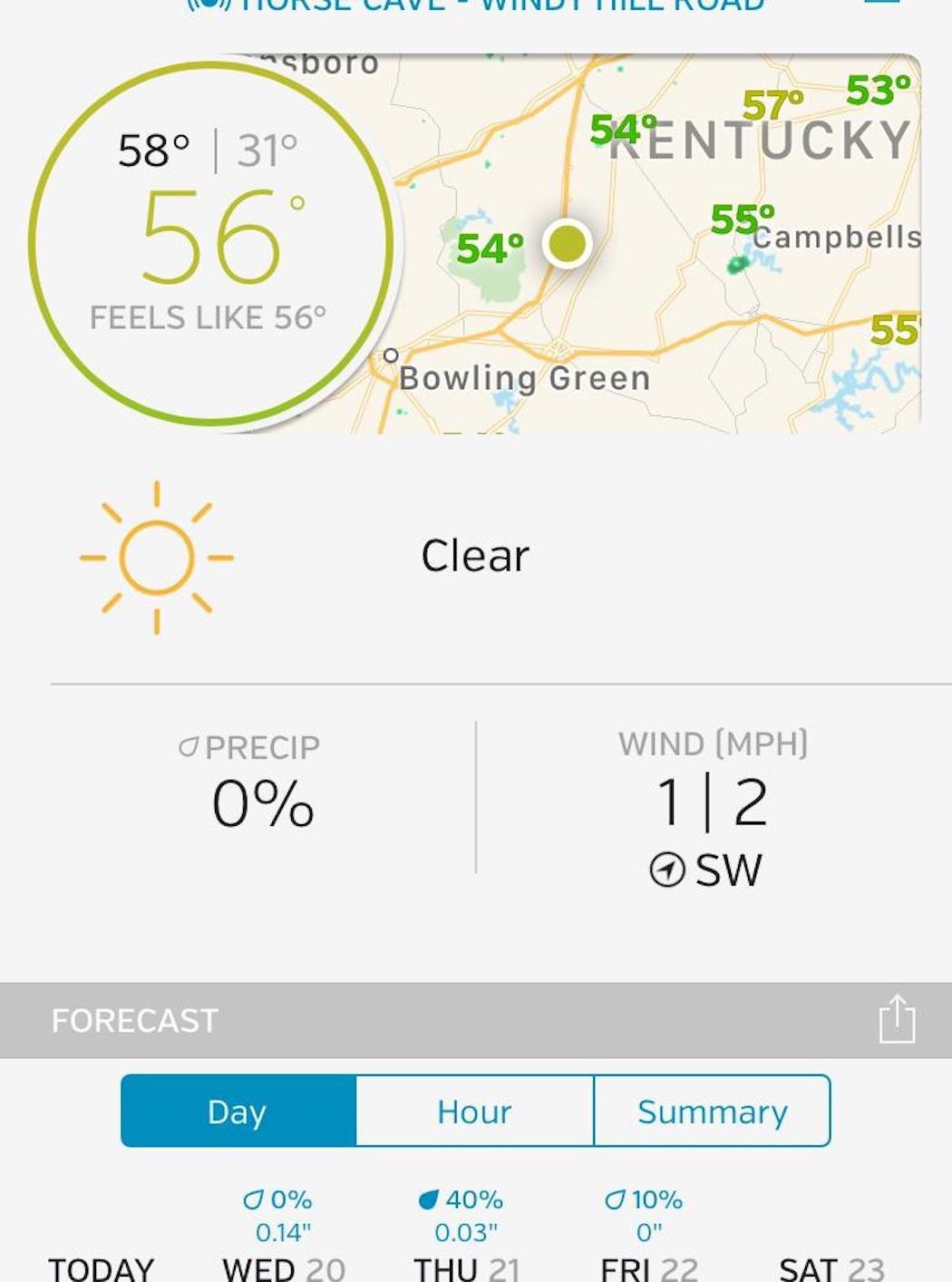 Check Weather Forecasts and Monitor It While Afield
Check Weather Forecasts and Monitor It While AfieldMother Nature is tough. She doesn't discriminate. Stay vigilant in checking the weather before and during your trip into the outdoors. It could save your life in the event that inclement weather pops up.
Photo Credit: Josh Honeycutt
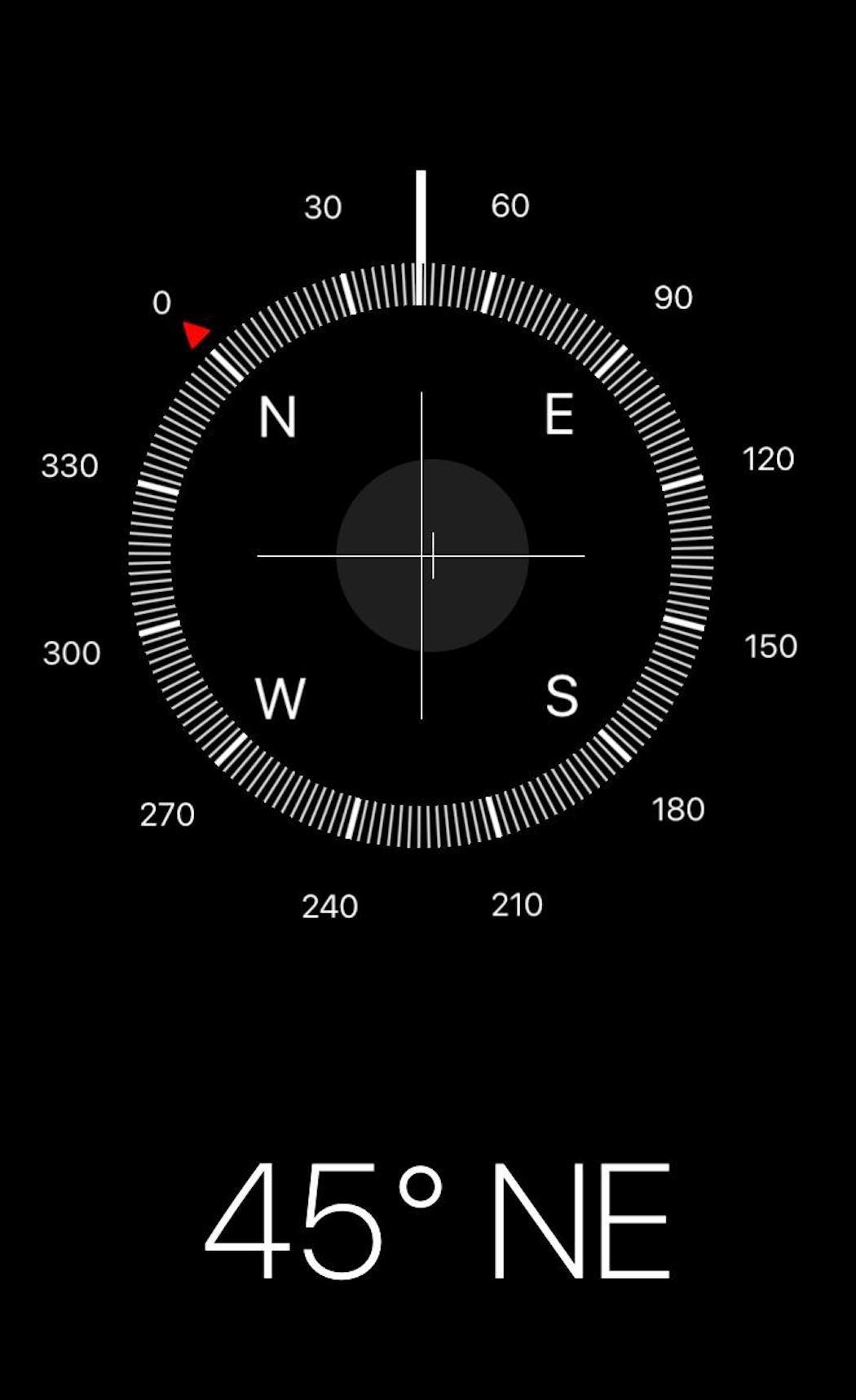 Keep Navigating Tools with You on the Hunt
Keep Navigating Tools with You on the HuntMap. Compass. GPS. Keep navigating tools in your hunting pack in the event you get lost. Better to have it and not need it than need it and not have it.
Photo Credit: Josh Honeycutt
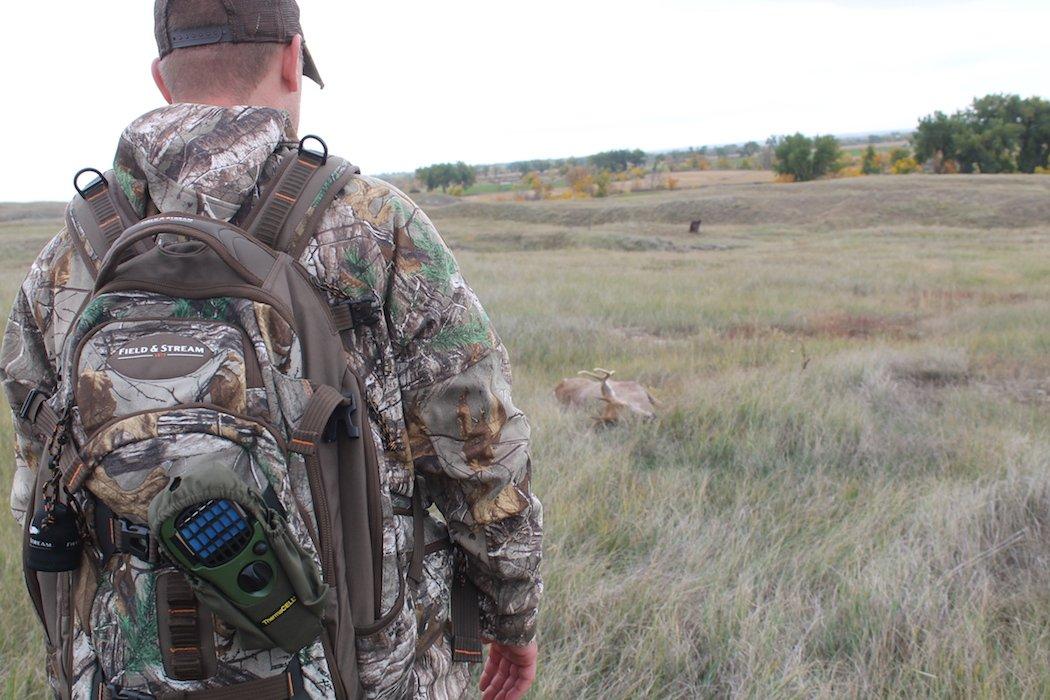 Dress Properly for the Hunt You're Going On
Dress Properly for the Hunt You're Going OnDressing appropriately is key. Don't wear too much. Don't wear too little. You don't want to sweat. You don't want to get cold. Hypothermia isn't a joke.
Photo Credit: Josh Honeycutt
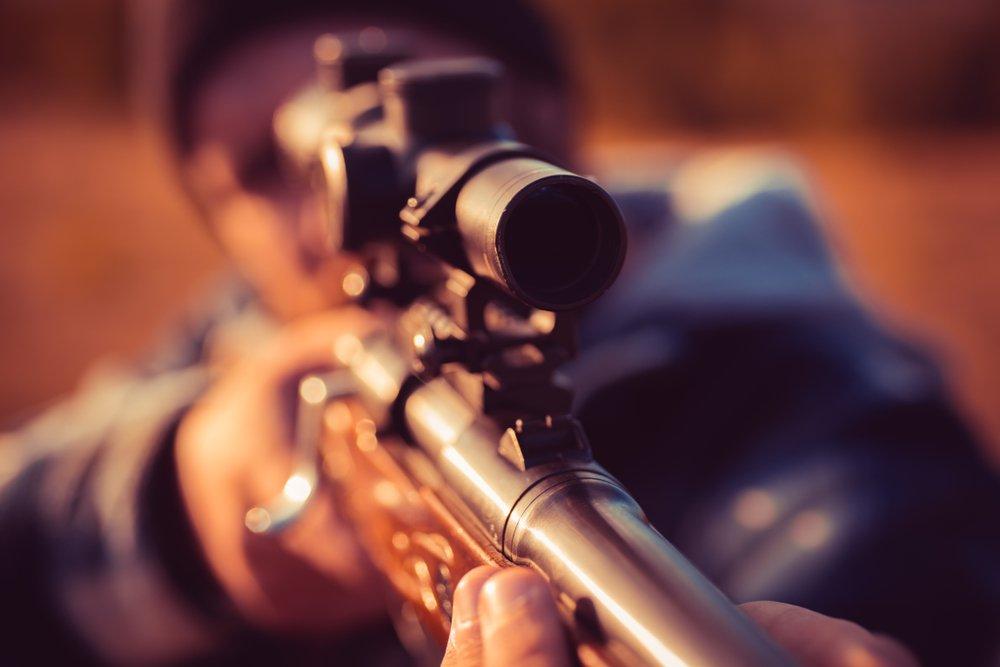 Don't Wear Clothing with Similar Colors as the Game You Pursue
Don't Wear Clothing with Similar Colors as the Game You PursueWearing clothing that looks like the game you're pursuing isn't a good idea. Making it possible for another hunter to mistake you for something you aren't is a great way for an accident to happen.
Photo Credit: Shutterstock / Dokhlib
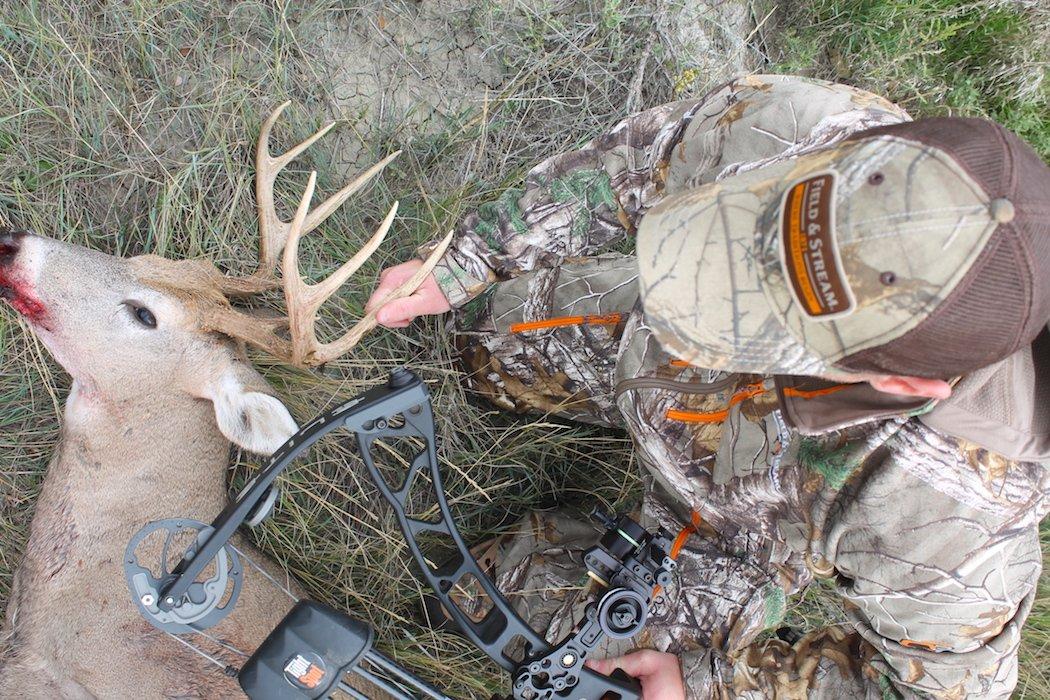 Wear Camouflage Instead
Wear Camouflage InsteadInstead, wear a quality Realtree camo pattern that will help conceal you. You want to blend into your environment ‚ not stand out.
Photo Credit: Josh Honeycutt
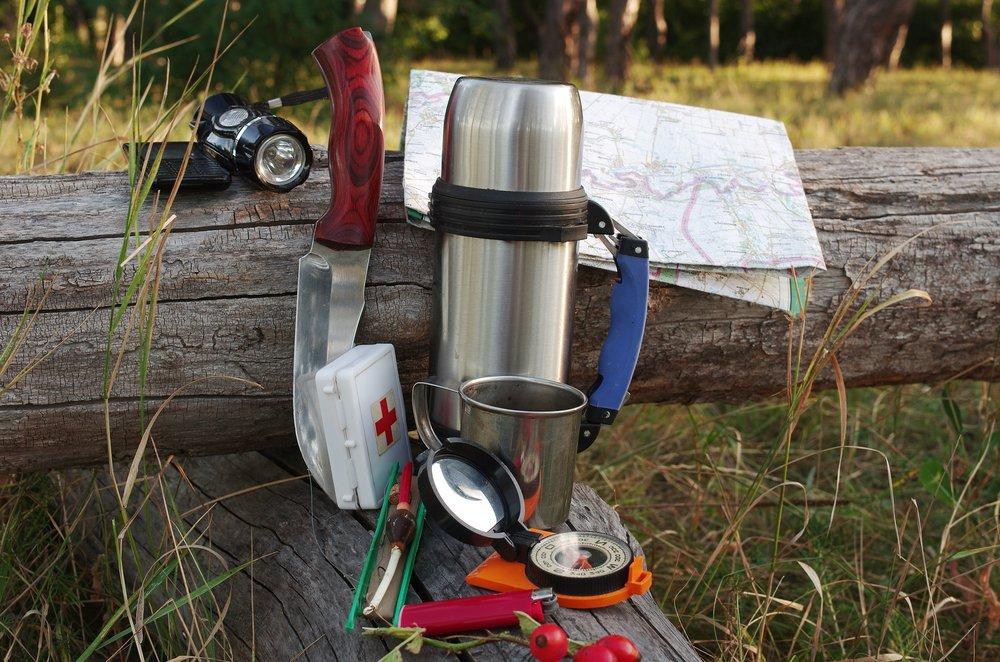 Include First-Aid and Survival Gear in Your Hunting Pack
Include First-Aid and Survival Gear in Your Hunting PackSurvival gear is important to keep in your pack. Emergency blankets. Bandages. Disinfectant. The whole kit. Have it all on hand in the event you or someone else gets injured or stranded.
Photo Credit: Shutterstock / Zhelty
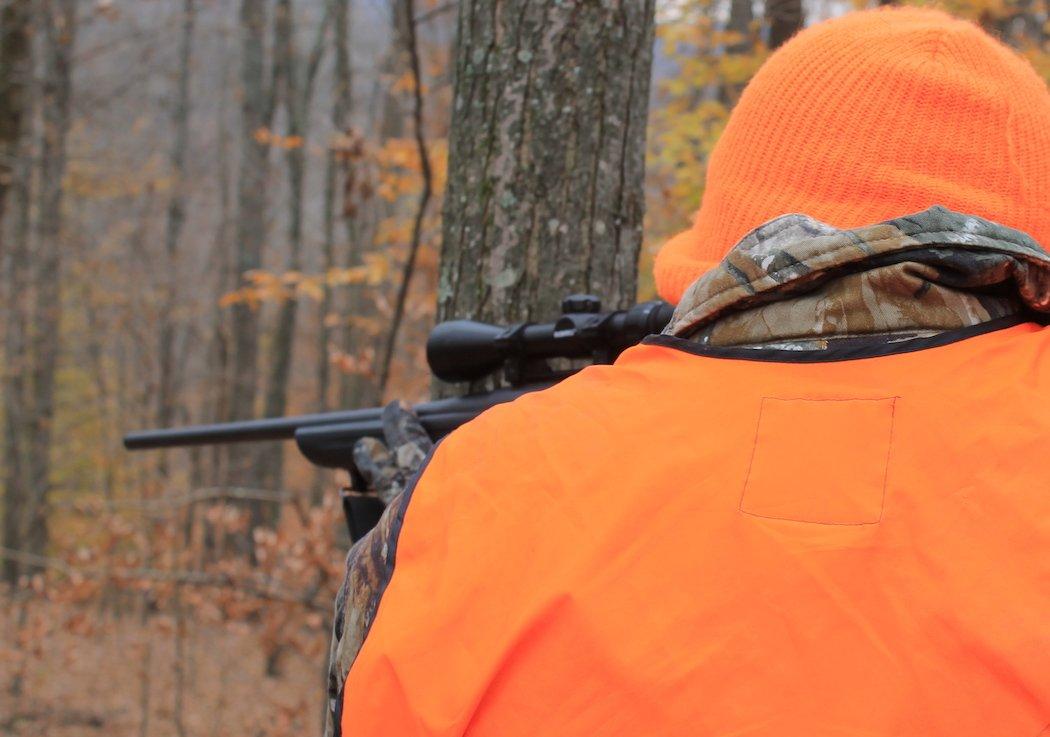 Always Point Your Weapon in a Safe Direction
Always Point Your Weapon in a Safe DirectionKeep the business end of your hunting weapon pointed in a safe direction at all times. Don't point it toward people. That might sound rudimentary. But you wouldn't believe the number of times I was walking in the woods and gun barrel was pointed toward my face. It happens.
Photo Credit: Josh Honeycutt
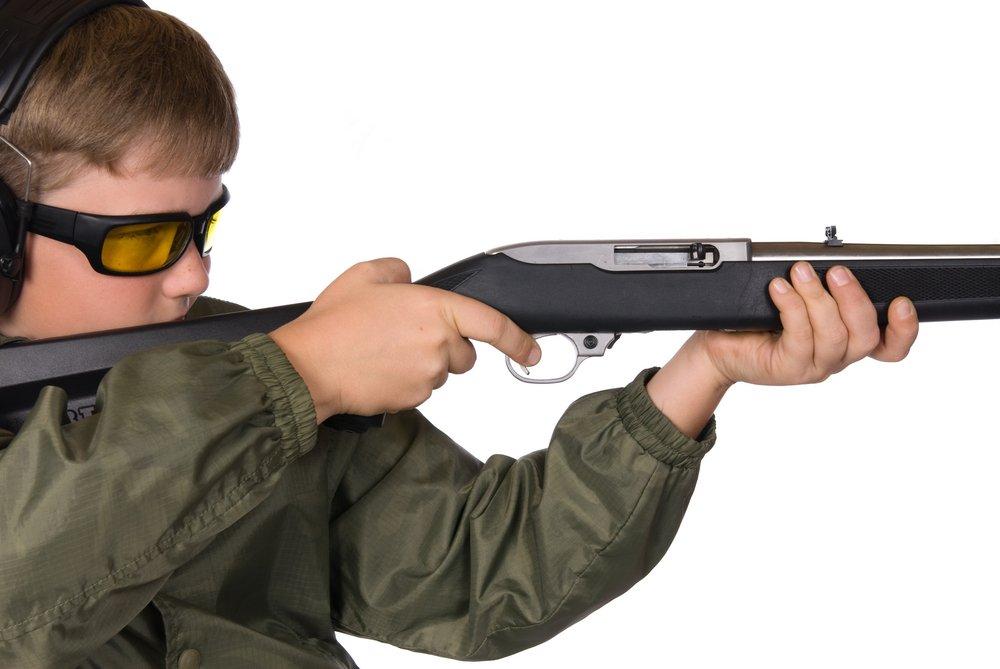 Wear Safety Glasses and Ear Plugs When Sighting Firearms
Wear Safety Glasses and Ear Plugs When Sighting FirearmsYour hearing and eyesight are irreplaceable commodities. Don't take them for granted. Wear safety glasses and ear plugs anytime you use or are around firearms.
Photo Credit: Shutterstock / Joe Belanger
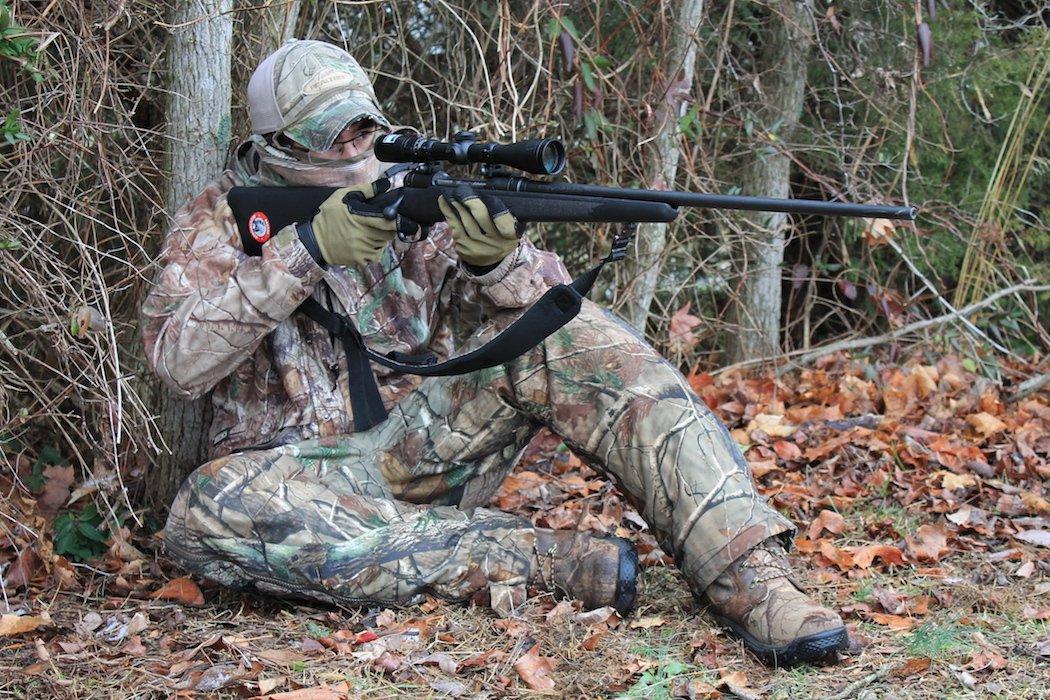 Always Act as If a Gun Is Loaded (Even When It Isn't)
Always Act as If a Gun Is Loaded (Even When It Isn't)Always act as if the guns you (and others) have are loaded ‚ even if you know they aren't. It's good practice to treat all guns as if they have a round chambered and ready to fire. Respect the power a firearm has and don't forget to take it seriously.
Photo Credit: Chantal Honeycutt
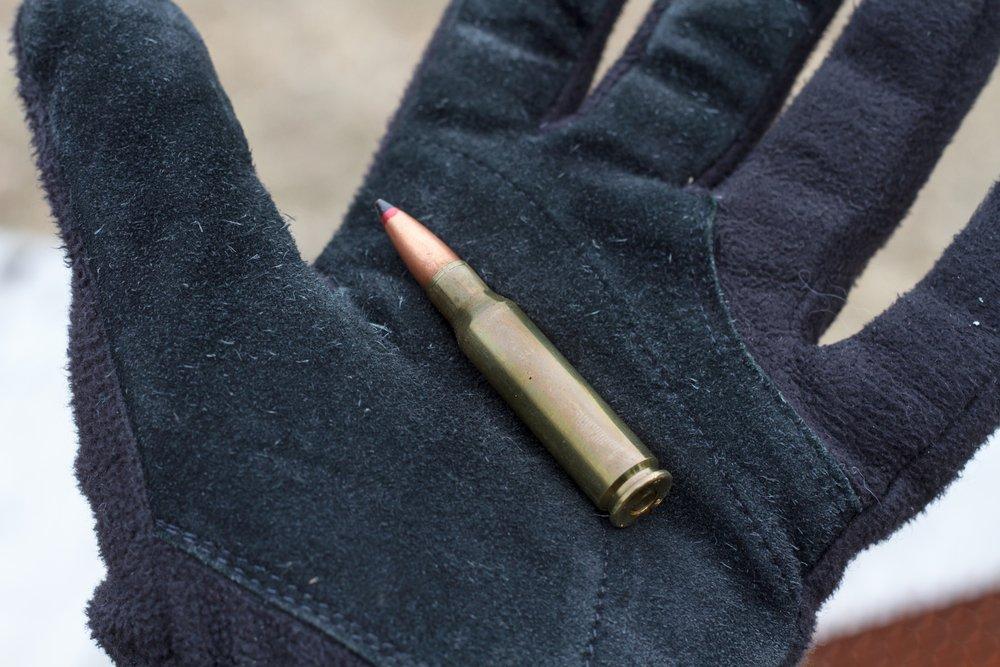 Unload Firearms When Not Actively Hunting in the Field
Unload Firearms When Not Actively Hunting in the FieldIf you aren't in the field, there shouldn't be any bullets in your gun. Unload firearms before going indoors. Unload them before getting into vehicles. Simply put, if you aren't taking aim or waiting to do so, there shouldn't be a round in your gun.
Photo Credit: Shutterstock / Vadim
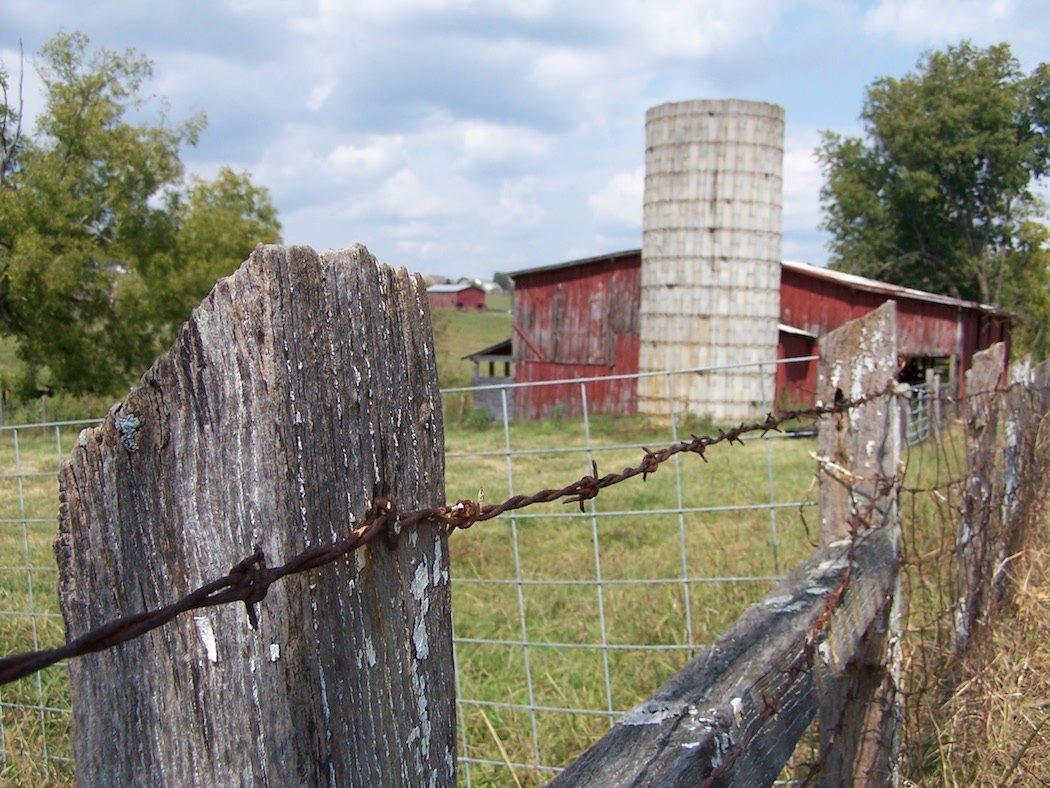 Don't Hold Firearms In-Hand When Crossing Fences and Other Obstacles
Don't Hold Firearms In-Hand When Crossing Fences and Other ObstaclesIt's one of the first things you learn in your hunter's education course. It's a great rule of thumb, too. Don't hold a firearm when crossing fences and other obstacles. If you're on your own, safely lay the gun on the ground. If with someone, hand the gun across to them after they cross.
Photo Credit: Josh Honeycutt
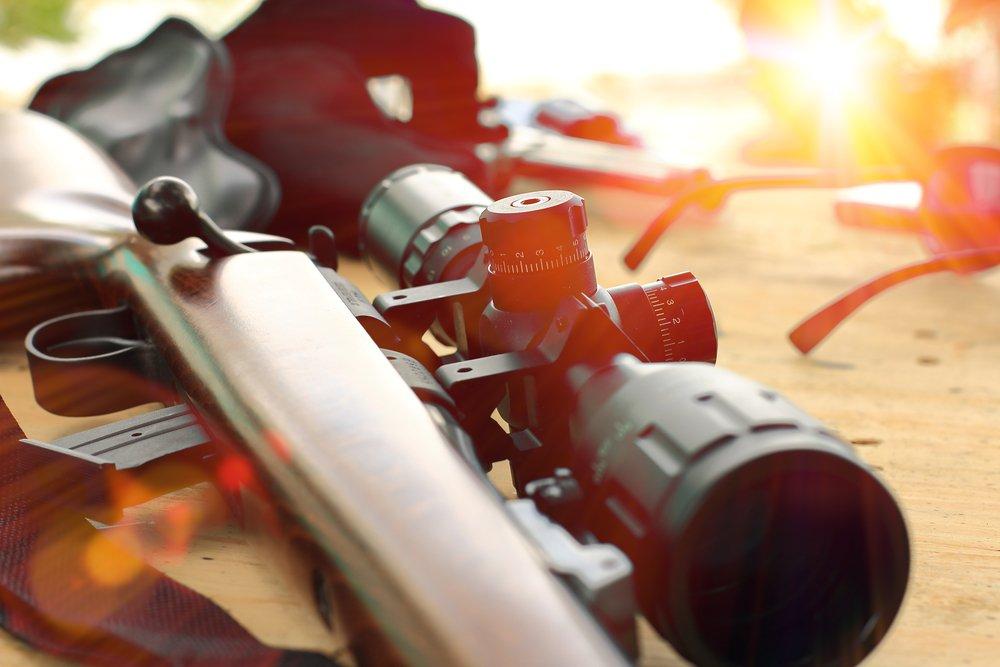 Prevent and Check for Barrel Obstructions in Firearms
Prevent and Check for Barrel Obstructions in FirearmsA barrel obstruction is a one-way ticket to serious harm or even death. Firing a round when something is blocking inside the barrel is extremely dangerous. Take every precaution to prevent this from happening.
Photo Credit: Shutterstock
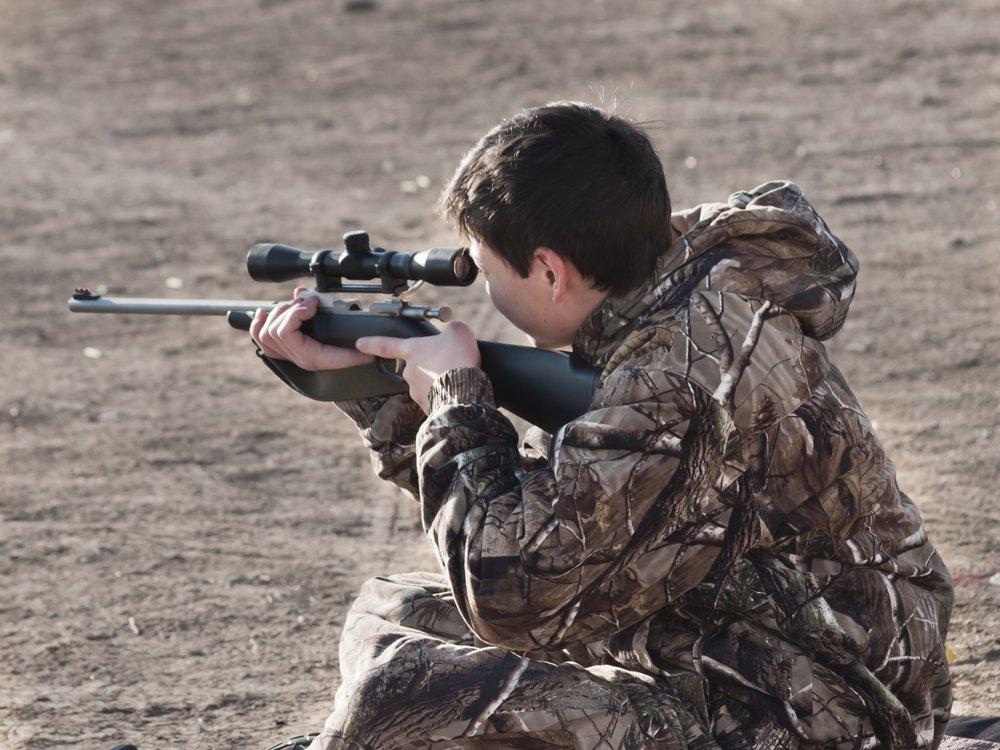 If Your Gun Doesn't Fire, Keep It Pointed in a Safe Direction and Wait
If Your Gun Doesn't Fire, Keep It Pointed in a Safe Direction and WaitMisfires aren't altogether common. But they do happen. When they do, keep your gun pointed in a safe direction for at least two or three minutes. Even if you pull the trigger, and the round doesn't fire, it could do a delayed fire. That's no bueno. Best keep the gun pointed safely in case it does.
Photo Credit: Shutterstock / Karina
 Always Check Weapons for Faulty Parts
Always Check Weapons for Faulty PartsDamaged equipment has serious potential for bodily harm. Regularly check your equipment for faulty parts to prevent this.
Photo Credit: Chantal Honeycutt
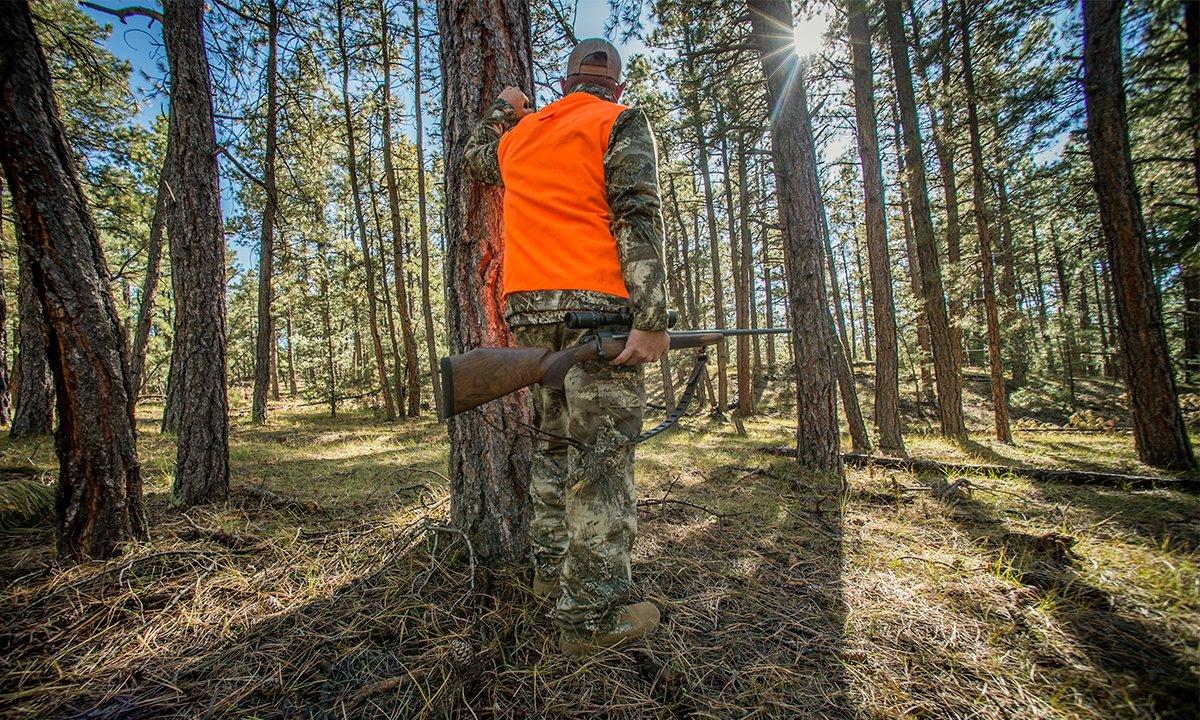 Wear Hunter Orange During Firearm Seasons
Wear Hunter Orange During Firearm SeasonsState laws don't require it for no reason. Wear hunter orange during all firearm seasons ‚ even if it isn't required. You can't be too careful when gun hunting in areas where other hunters could possibly be.
Photo Credit: Bergara
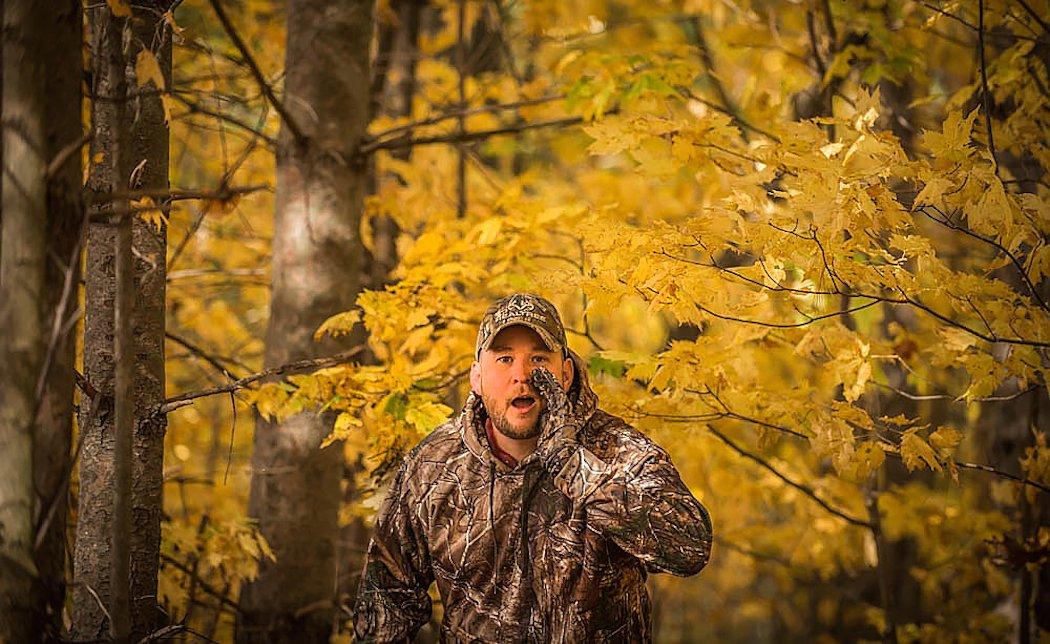 If You See Another Hunter, Make Yourself Known with Sound ‚ Not Motion
If You See Another Hunter, Make Yourself Known with Sound ‚ Not MotionIt's extremely common for hunters to bump into other hunters while in the outdoors. When this happen, speak out to them without moving. Make your presence known, and once they've heard and acknowledged you're there, then move.
Photo Credit: Bill Konway
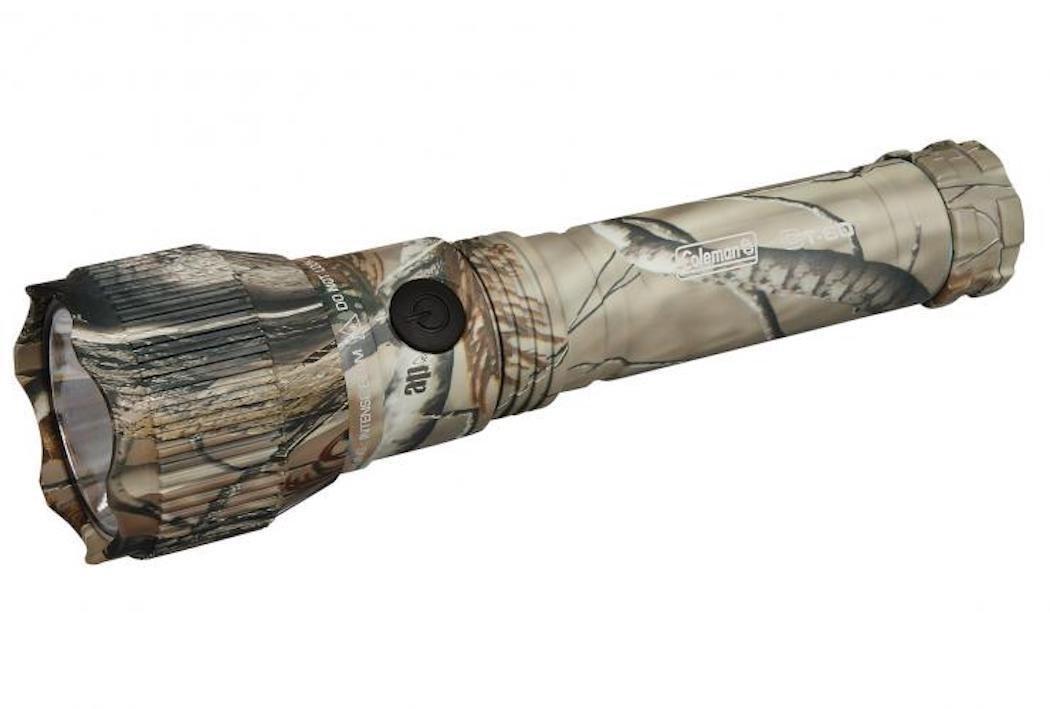 Use a Flashlight When Hunting in Areas Near Other Hunters
Use a Flashlight When Hunting in Areas Near Other HuntersI generally don't use a flashlight (when it's dark) while hunting on private property that other hunters aren't on. But if there is even a slight possibility that someone could be in the area, use a flashlight to make your presence known so you aren't mistaken for an animal.
Photo Credit: Coleman
 Be Mindful and Respectful of Other Hunters Around You
Be Mindful and Respectful of Other Hunters Around YouRespect others. That simple act will prevent a lot of altercations that happen between hunters every season. Keep that in your hip pocket for when you find yourself in a stressful situation.
Photo Credit: Bill Konway
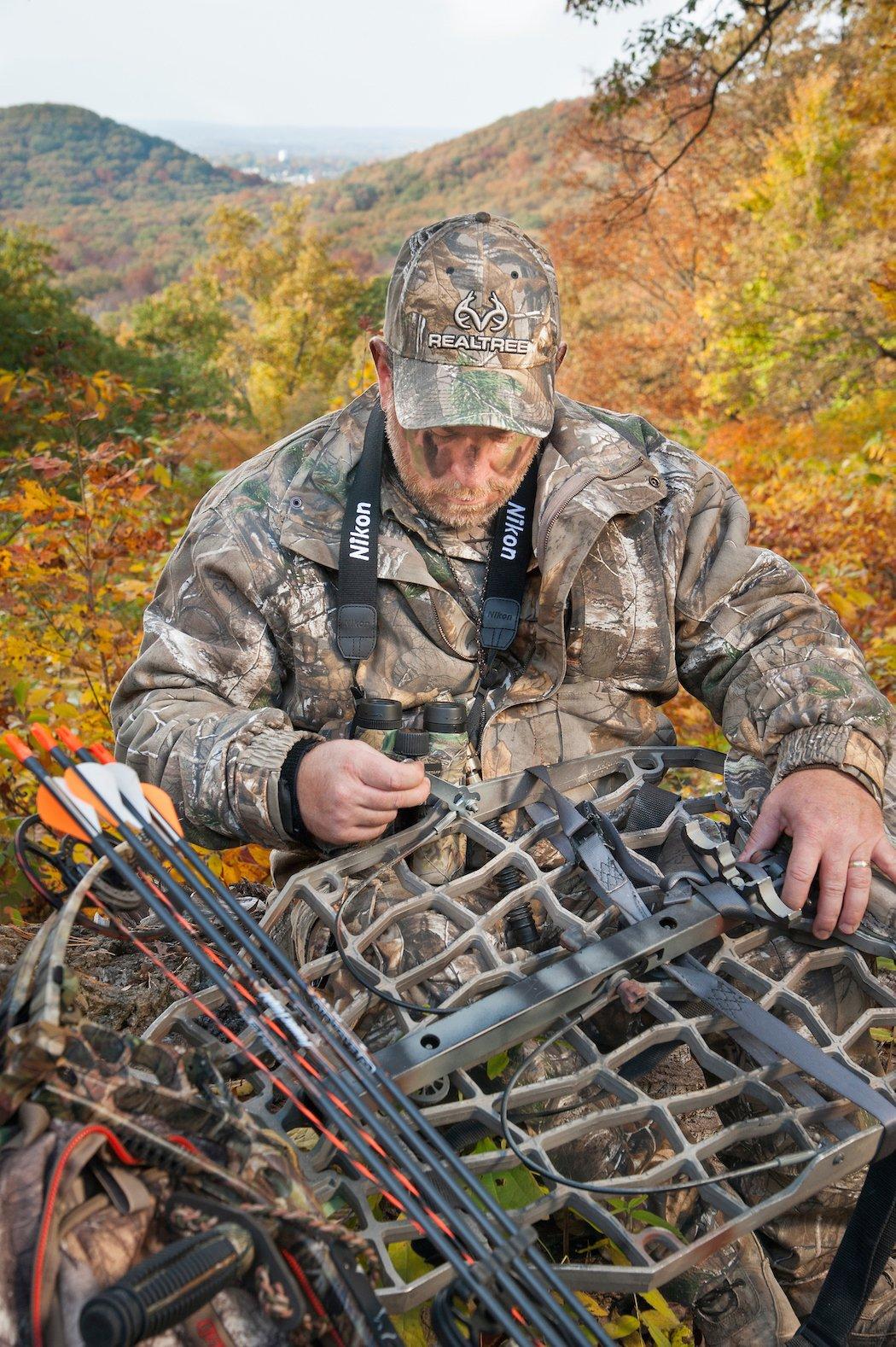 Inspect Treestands and Blinds for Damage Annually
Inspect Treestands and Blinds for Damage AnnuallyTreestands and ground blinds break down over time. Do annual inspections at the very least is crucial for safety. Check for rusted metal, loose bolts and broken components. Fix them if you can. Replace them if you can't.
Photo Credit: Realtree
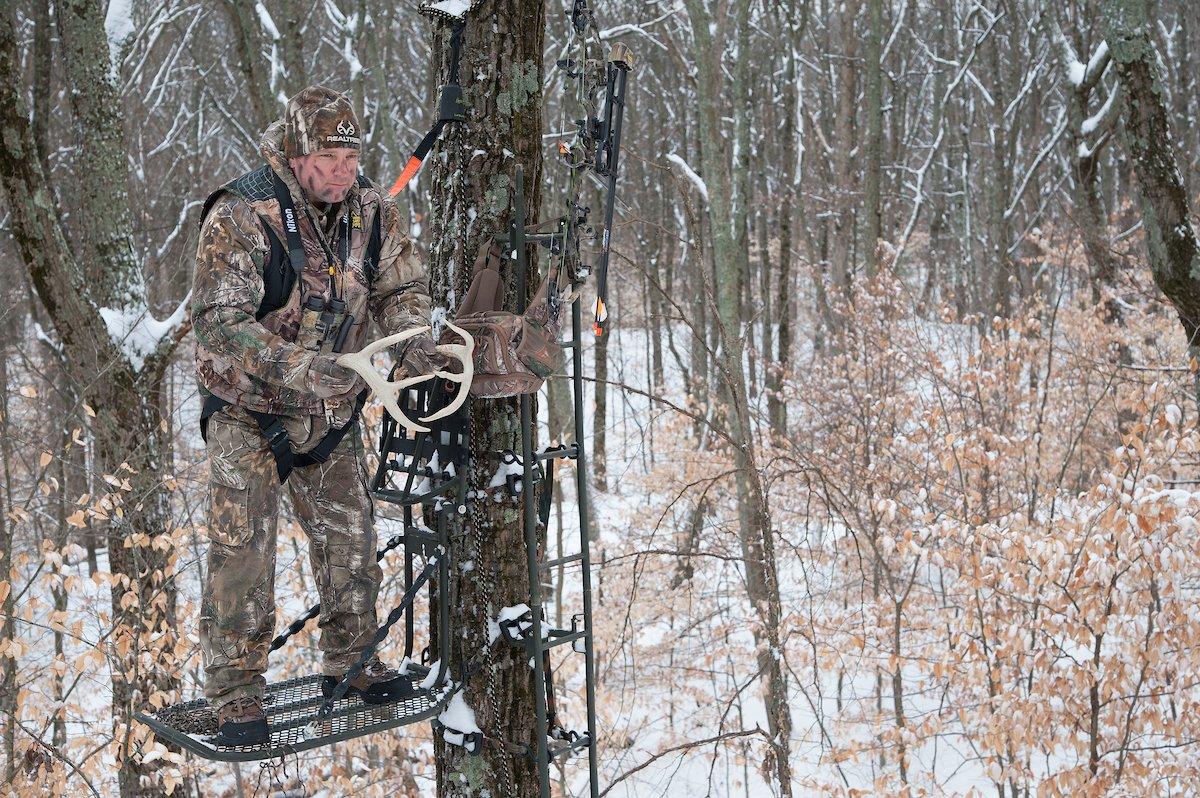 Use a Safety Harness and Safety Line When Hunting from Elevated Positions
Use a Safety Harness and Safety Line When Hunting from Elevated PositionsWearing a safety harness and using a safety line doesn't need explanation. Use them. You risk everything by not doing so.
Photo Credit: Realtree
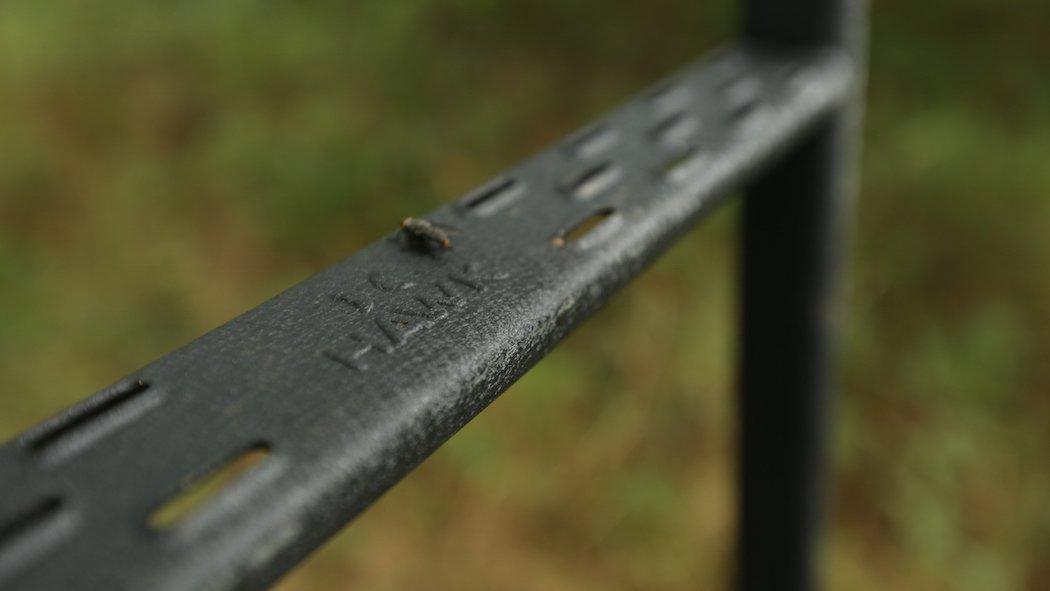 Keep Three Points of Contact When Climbing
Keep Three Points of Contact When ClimbingFollow the three-point rule when climbing into a stand or elevated blind. This is important for safe climbing of any kind.
Photo Credit: Shutterstock / Realtree
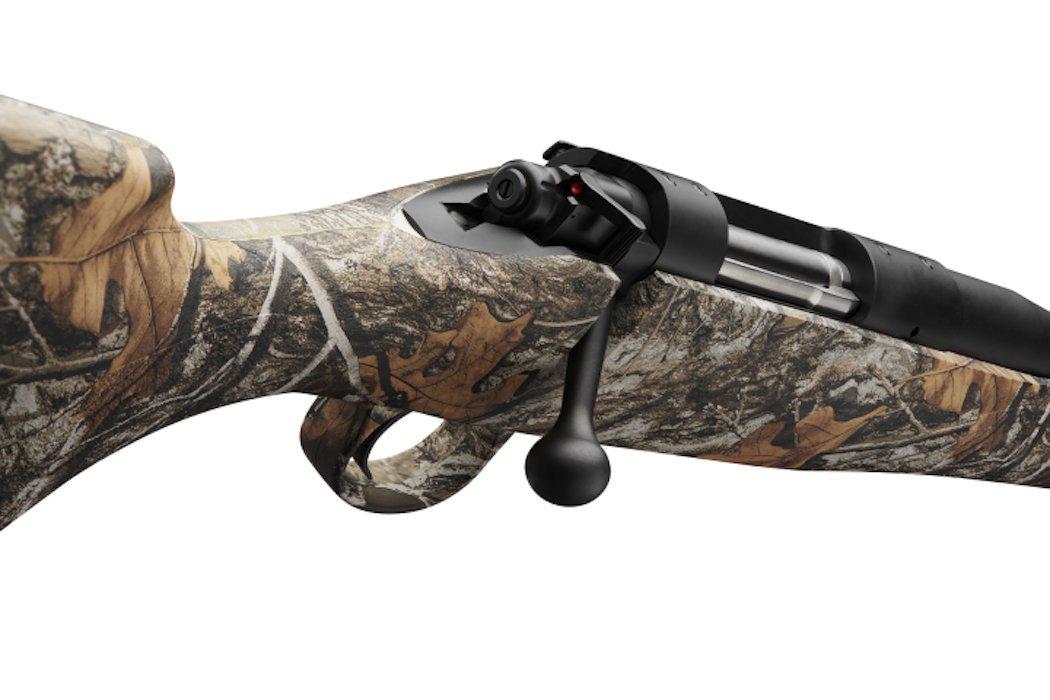 Unload Guns Before Pulling Them Up into a Treestand
Unload Guns Before Pulling Them Up into a TreestandDon't hoist a loaded gun into the treestand. Unload it before you pull it up. One simple act that could save your or someone else's life.
Photo Credit: Kimber
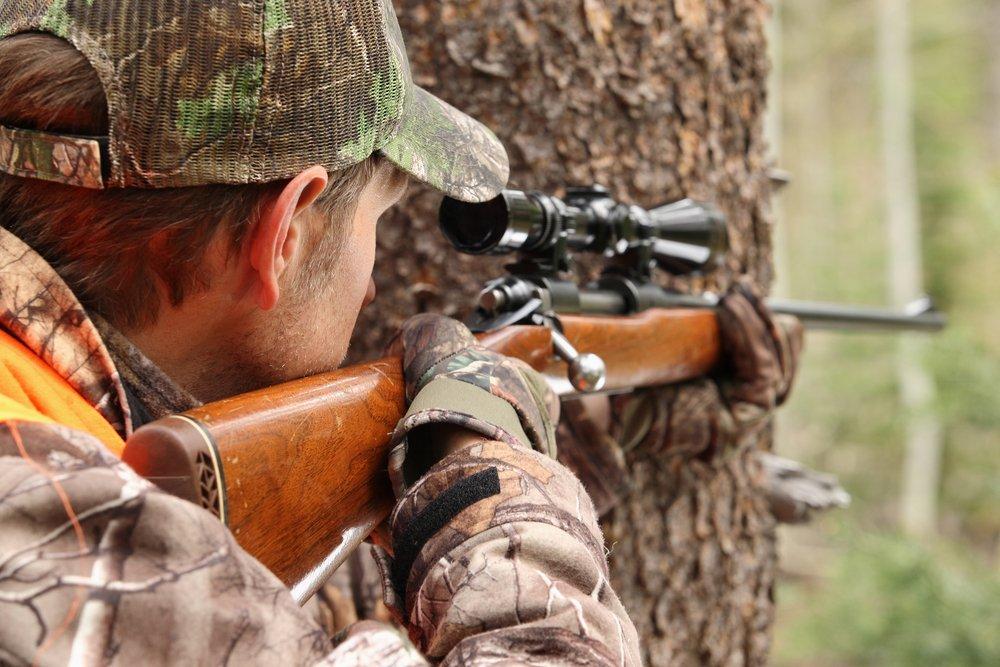 Clearly Identify Your Target Before Taking the Shot
Clearly Identify Your Target Before Taking the ShotDon't shoot unless you clearly identify your target. Don't shoot if you're unsure what you're looking at. Take responsible shots ‚ not risky ones.
Photo Credit: Shutterstock / Allred
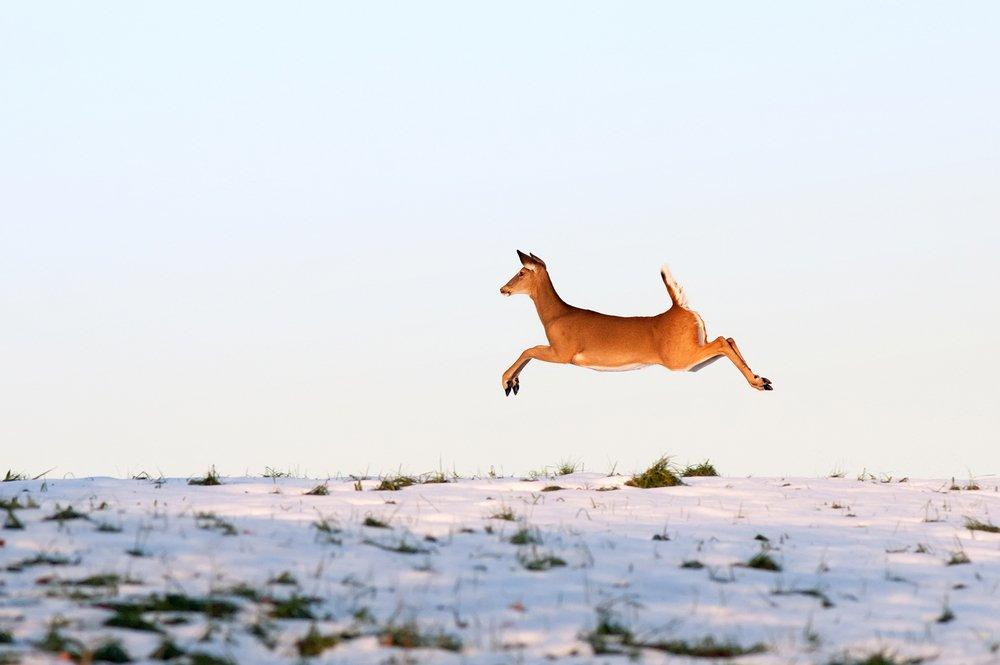 Don't Take Shots at Game Without a Background
Don't Take Shots at Game Without a BackgroundMake sure there's a safe background beyond your target. Shooting at game that's sky-lined is unacceptable. Bullets can travel for miles without a safe background to stop them. Always make sure there's (safe) solid ground beyond your target.
Photo Credit: Shutterstock
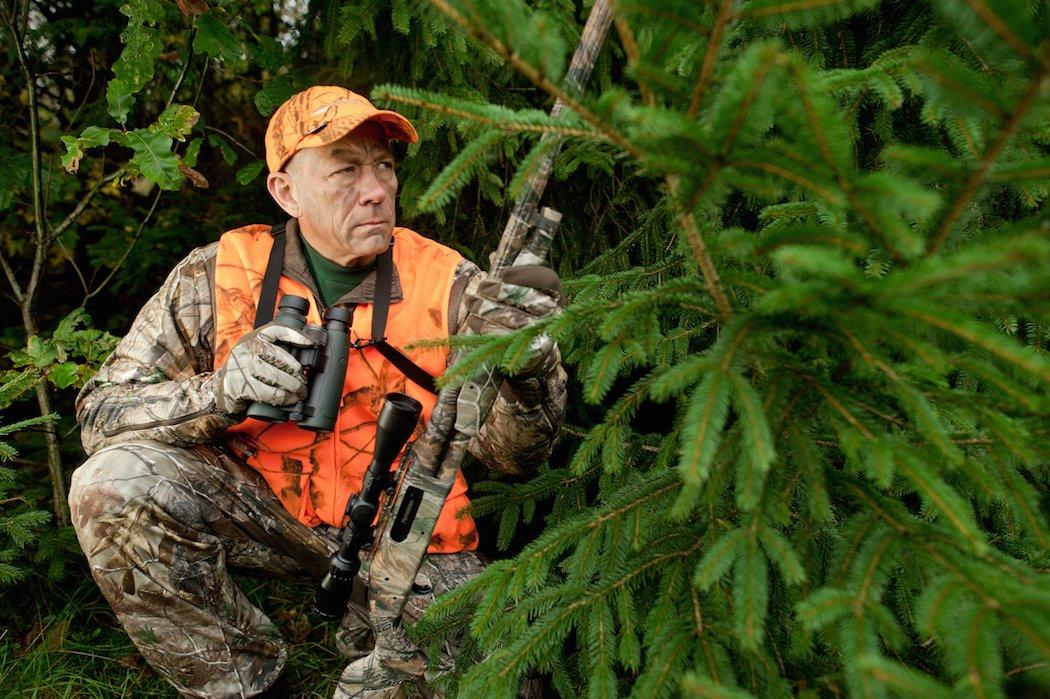 Orchestrate Deer Drives Responsibly
Orchestrate Deer Drives ResponsiblyDeer drives are effective. But they can be dangerous if not executed properly (and safely). Map out where everyone will be. Know where they are at all times. Never shoot in anyone else's direction.
Photo Credit: Realtree
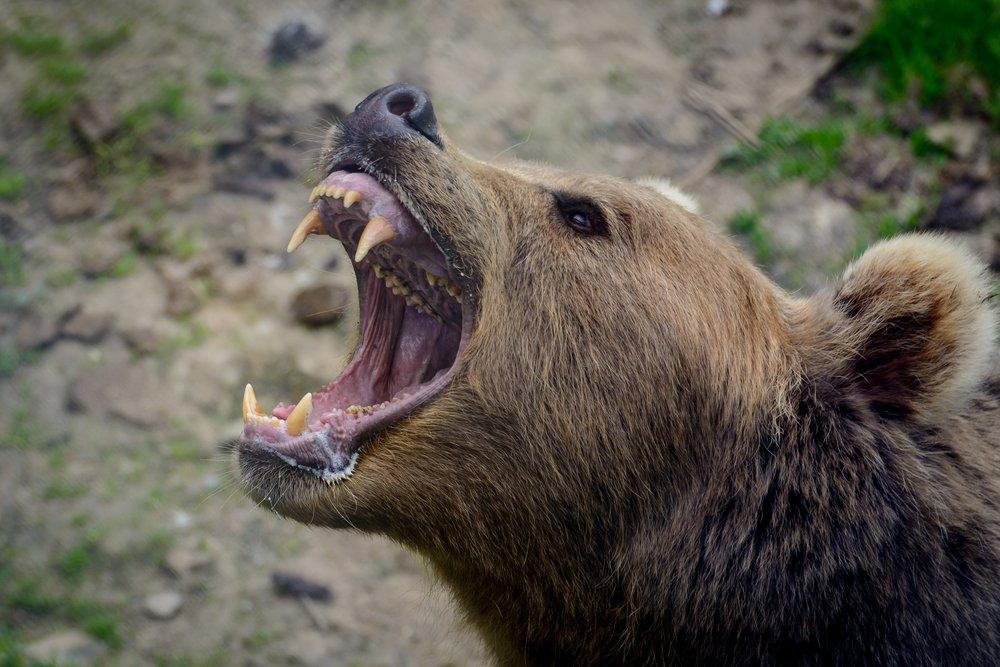 Be Aware of Dangerous Game While Hunting in Areas That Have Them
Be Aware of Dangerous Game While Hunting in Areas That Have ThemPredators are just that ‚ predators. Be aware of your surroundings when hunting in areas they inhabit. Your life might just depend on it.
Photo Credit: Terje
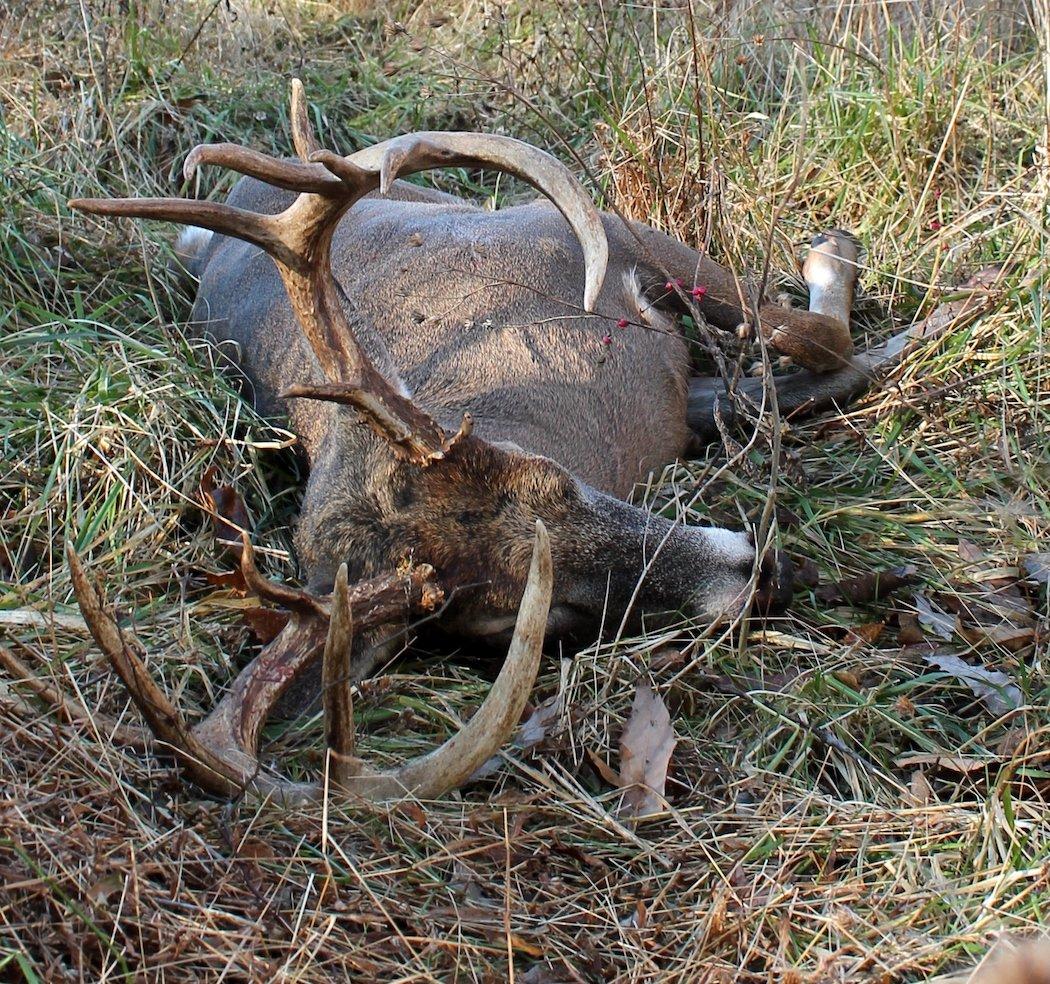 Bonus: Everything Else
Bonus: Everything ElseIt's important to note that we've barely scratched the surface here. There are hundreds of other safety tips we haven't even hinted at. The key point ‚ always be safe and responsible when deer hunting.
Don't Miss: 20 Deer Hunting Lies Your Granddaddy Told You
Photo Credit: Josh Honeycutt
Are you a deer hunter wanting to learn how to accomplish your goals? Check out our stories, videos and hard-hitting how-to's on deer hunting.











































